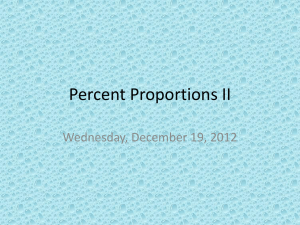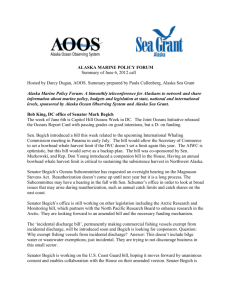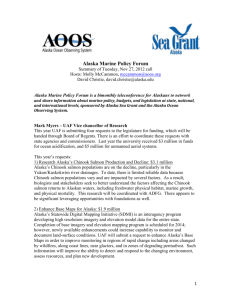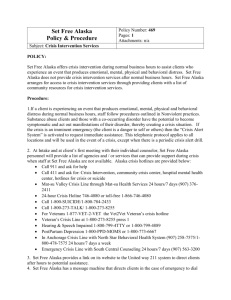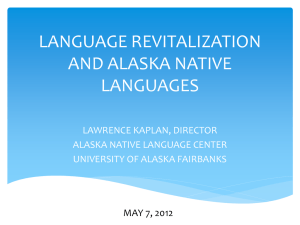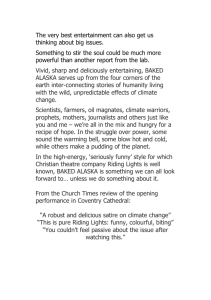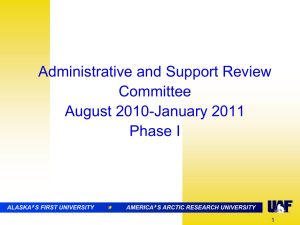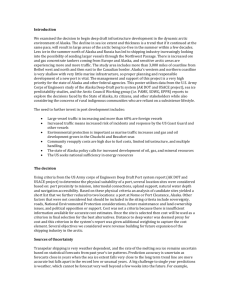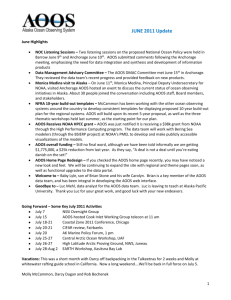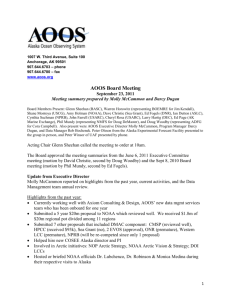March 2012 - AOOS.org - Alaska Ocean Observing System
advertisement
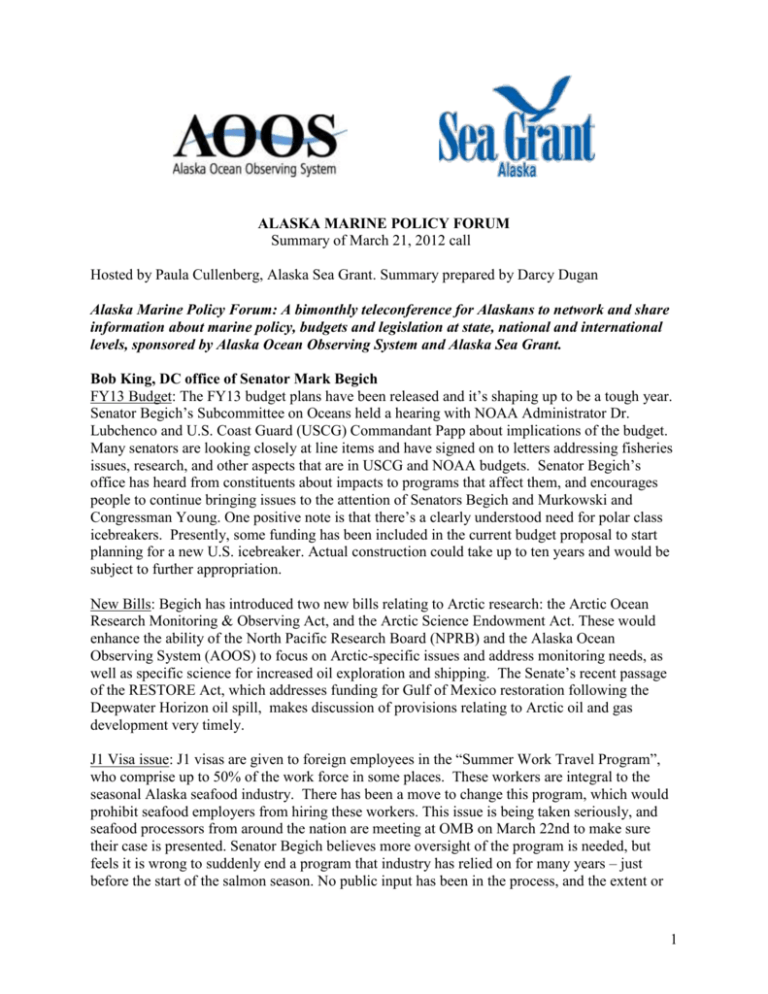
ALASKA MARINE POLICY FORUM Summary of March 21, 2012 call Hosted by Paula Cullenberg, Alaska Sea Grant. Summary prepared by Darcy Dugan Alaska Marine Policy Forum: A bimonthly teleconference for Alaskans to network and share information about marine policy, budgets and legislation at state, national and international levels, sponsored by Alaska Ocean Observing System and Alaska Sea Grant. Bob King, DC office of Senator Mark Begich FY13 Budget: The FY13 budget plans have been released and it’s shaping up to be a tough year. Senator Begich’s Subcommittee on Oceans held a hearing with NOAA Administrator Dr. Lubchenco and U.S. Coast Guard (USCG) Commandant Papp about implications of the budget. Many senators are looking closely at line items and have signed on to letters addressing fisheries issues, research, and other aspects that are in USCG and NOAA budgets. Senator Begich’s office has heard from constituents about impacts to programs that affect them, and encourages people to continue bringing issues to the attention of Senators Begich and Murkowski and Congressman Young. One positive note is that there’s a clearly understood need for polar class icebreakers. Presently, some funding has been included in the current budget proposal to start planning for a new U.S. icebreaker. Actual construction could take up to ten years and would be subject to further appropriation. New Bills: Begich has introduced two new bills relating to Arctic research: the Arctic Ocean Research Monitoring & Observing Act, and the Arctic Science Endowment Act. These would enhance the ability of the North Pacific Research Board (NPRB) and the Alaska Ocean Observing System (AOOS) to focus on Arctic-specific issues and address monitoring needs, as well as specific science for increased oil exploration and shipping. The Senate’s recent passage of the RESTORE Act, which addresses funding for Gulf of Mexico restoration following the Deepwater Horizon oil spill, makes discussion of provisions relating to Arctic oil and gas development very timely. J1 Visa issue: J1 visas are given to foreign employees in the “Summer Work Travel Program”, who comprise up to 50% of the work force in some places. These workers are integral to the seasonal Alaska seafood industry. There has been a move to change this program, which would prohibit seafood employers from hiring these workers. This issue is being taken seriously, and seafood processors from around the nation are meeting at OMB on March 22nd to make sure their case is presented. Senator Begich believes more oversight of the program is needed, but feels it is wrong to suddenly end a program that industry has relied on for many years – just before the start of the salmon season. No public input has been in the process, and the extent or 1 timeline for the changes has been unclear. Begich has called for a normal rule-making schedule over the course of a year, allowing for public input and comment. If changes need to be made, this timeline would allow industry to adjust for the 2013 season. Alaska Dispatch Article from March 19th Other fishing issues: A “United We Fish” rally was held on March 21st in DC where commercial and recreational fishing groups (mainly from the east coast) organized to promote changes to the Magnuson Stevens Act. They called for enhancing flexibile regulations with catch shares and other aspects. Senator Begich couldn’t attend, but there were many speeches, including those by east coast senators. Chris Hess, Staff to Representative Reggie Joule Legislative Resolutions: The Northern Waters Task Force (NWTF) has wrapped up and produced two resolutions that are currently moving through the Legislature. The first supports the USCG and the funding of icebreakers. The second creates a 17-member Arctic Policy committee. The second one has made it through all the House committees and is getting ready for a vote on the floor. The fiscal note is $300K/year for several years (probably until 2015). The companion resolution in Senate Finance also has support. NWTF website. Port Study: The Governor’s budget includes funding for an Arctic port study. The goal of the study is to identify 5-7 potential port sites by the end of 2012, and then conduct further analysis between 2012-2014 for a final site proposal. NWTF activities: The Northern Waters Task Force is in a “raising awareness” phase, and members have been briefing state and federal agencies, the Alaska Congressional delegation, the Arctic Caucus, the Legislature, and others. They hosted a presentation to the Legislature by Fran Ulmer, chair of the U.S. Arctic Research Commission, on Arctic research. The USCG also gave a briefing in Juneau on their plans for 2012 summer operations in the Arctic. By the end of the Legislative session, the NWTF will know whether a second commission (based on the resolution described above) has been approved. Erin Harrington, Staff to Representative Alan Austerman, Kodiak The Coastal Zone Management Bill, HB325 (which would restore the Alaska Coastal Zone Management Program), is currently in House Resources. It is essentially the same language as that included in the voter initiative, although it needs to be redrafted to be consistent with drafting policies. It was heard last week by Resources Chair Seaton, but due to alternating committee chairs, it may not have a hearing this week. During last week’s hearing, the committee went over the three scenarios that could unfold between ballot initiative and legislation over the next few weeks in Juneau: 1) The legislature doesn’t pass a bill. Then the Lt. Governor puts the voter initiative on the first statewide ballot scheduled at least after 120 days after adjournment of the legislature. This would be the August primary. 2) The Legislature passes a bill whose intent is “substantially” the same as the ballot initiative. If it is not vetoed by the Governor, the Lt Gov will remove the initiative from the ballot. This could be litigated based on any language differences. 2 3) The Legislature does NOT pass a bill with intent that is substantially the same as the ballot imitative, and the Governor signs the bill. Then the initiative would remain on the ballot, and the initiative sponsors would need to decide how much to campaign. Ballot initiative sponsor Bruce Botehlo (Juneau mayor) has said if the legislation meets the needs of the initiative sponsors – even if it wasn’t exactly the same as the original initiative – they would be satisfied and no longer pursue the initiative. The House is currently lacking support for working on coastal zone legislation, and the end of session is nearing. Staff did not have a clear sense of how things will work out. The Senate hasn’t filed any legislation on this topic, but could if they wanted. It is also unclear which ballot the initiative might be placed on – the August primary or the November election. It must be 120 days after the end of the legislative session, so if the legislature goes into extended session (extending past 104 days), it would end up on general ballot rather than the primary ballot. That is unlikely, however, because the House has voiced its commitment to sticking to a 90-day session. Rob Earl Staff to Representative Bob Heron Endowment for Chinook research: Language is going through both the House and Senate to create an endowment in the Department of Revenue for Chinook salmon research. The bill currently doesn’t include funding, but may have a hearing in the Senate Finance committee next week. The House version, HB332, doesn’t look like it will be heard soon. DCCD would administer the fund, or subcontract administration out to another organization. Darcy Dugan, Alaska Ocean Observing System (AOOS) New Arctic Mapping Tools: AOOS and partners have received funding from NOAA to develop data visualization tools for Alaska’s Arctic. The project is called STAMP – Spatial Tools for Arctic Mapping and Planning - and its goal is to develop data integration and visualization tools that could be used to help plan for future decision-making relating to potential commercial fisheries in the Arctic. The project is 1.5 years and will focus on the northern Bering and Chukchi Seas. Project staff will be looking for input for how this tool can best be designed to meet diverse needs. STAMP website. NOAA/Industry Data sharing agreement: NOAA and the oil companies pursuing offshore development in the Chukchi/Beaufort signed an umbrella MOU agreement last summer establishing a data sharing partnership. The first annex of the agreement is nearly completed, and will result in NOAA – and through NOAA, AOOS - receiving met-ocean data from the industry. The second annex will cover environmental data and will be made available to the public through the AOOS data portal. Doug Demaster, NOAA, Alaska Fisheries Science Center (AFSC) Whaling Quotas: 2012 is an International Whaling Commission (IWC) quota year, and the IWC will be meeting in Panama this summer. If things don’t go well there, some background work has been done with other countries to reach an agreement. Senators Begich and Murkowski have been involved. 3 Research Vessel Healy – The Bureau of Ocean Energy & Management (BOEM) and Shell are funding a research cruise on the USCG vessel the Healy this summer. They would like to include more fisheries research, and BOEM approached the Alaska Fisheries Science Center (AFSC) to include scientists on the vessel. The AFSC cannot accept money from Shell, so they are working with UAF to find an administrative solution. Budget & Fish Surveys: The NOAA FY 12 budget has been cut across the board, including the AFSC which is down 3-5%. The AFSC has requested one time funding to do the third of three Bering Sea ground fish surveys – a slope survey – which is currently unfunded. The other two (annual bottom trawl, and Aleutian Islands survey) will go forward due to high interest in atka mackerel issues. Additional support for the Bering groundfish slope survey will need to be secured or it will not happen. Talking Points for Leadership Meeting: NOAA and other agency leadership will be coming together in mid April at the USCG academy. There have been many requests to provide NOAA Administrator Dr. Lubchenco with talking points for that meeting. If you have items to be discussed, please send them to Amy Holman (Amy.Holman@noaa.gov) or Doug DeMaster (douglas.demaster@noaa.gov). David Christie, Alaska Sea Grant, UAF Budget Cuts: NOAA’s 2013 Presidents’ budget has small but significant cuts on the Alaska side: NURP – National Underwater Research Program which funds 5-6 projects per year through the university. This provides $1.2 million annually to Alaska for investigatorinitiated research projects, and its loss would mean 3-4 staff positions. Prescott Grants for marine mammal stranding network. There has been a letter writing campaign nationwide to keep the program, including the support of many senators. National Estuarine Research Reserve (NERR) Grad fellowships. Kasitsna Bay Lab – scheduled for “transition’ in 2014, which actually means closure. This is a $100K/yr reduction. A full list of impacts of the budget cuts to the university is being developed. There is a March 29th deadline for comments to the Senate for appropriations. The cost of these cuts is deceptive – often every dollar in cuts results in 5 dollars of overall program reductions due to lost leveraging and matches. Jeremy Robida, Prince William Sound Regional Citizens Advisory Council (PWSRCAC) The PWS tanker contingency plan is up for public review. Contact Jeremy with questions. jeremy.robida@pwsrcac.org. PWSRCAC contingency planning website. Upcoming Events March 26-April 3 March 28 – 31 April 3 June 24-28 North Pacific Fisheries Management Council – Anchorage Western Alaska Science Conference – Dillingham Arctic Landscape Conservation Cooperative RFP deadline National Marine Educators Association Conference – Anchorage Deadline for travel funding/scholarships: April 1st The next Alaska Marine Policy Forum teleconference will be Wednesday, May 23 at 1pm 4
